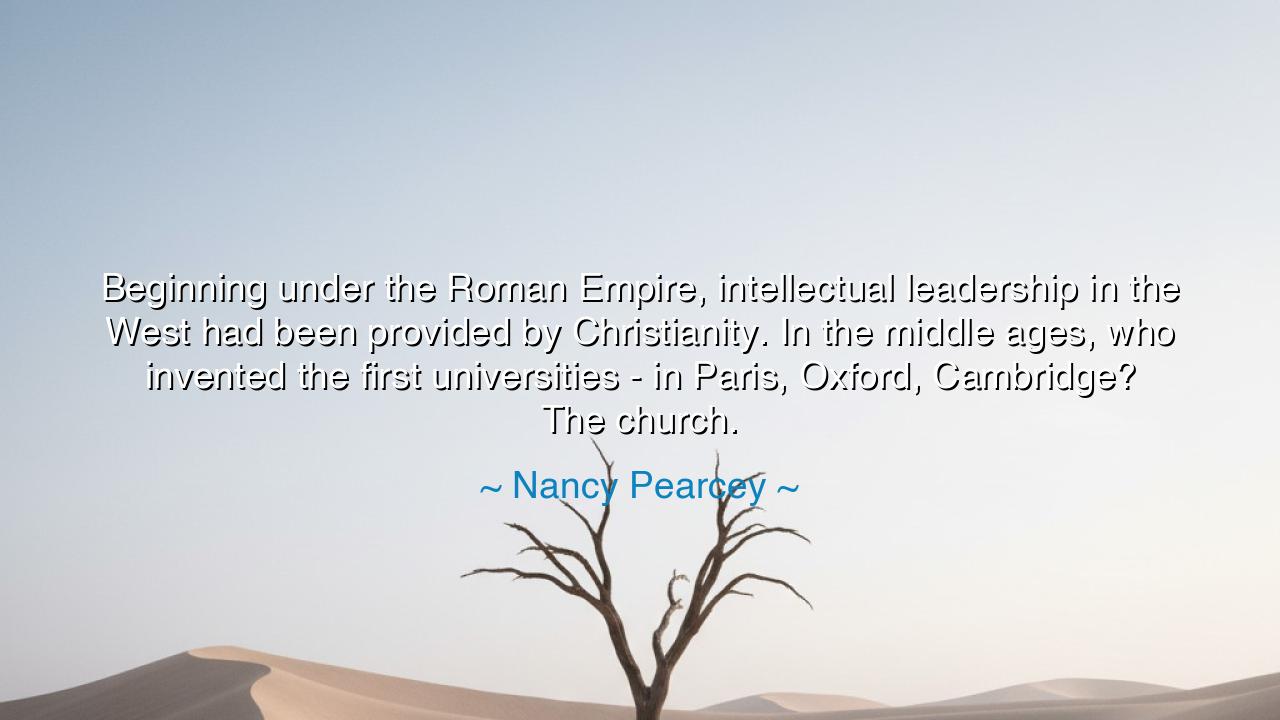
Beginning under the Roman Empire, intellectual leadership in the
Beginning under the Roman Empire, intellectual leadership in the West had been provided by Christianity. In the middle ages, who invented the first universities - in Paris, Oxford, Cambridge? The church.






“Beginning under the Roman Empire, intellectual leadership in the West had been provided by Christianity. In the Middle Ages, who invented the first universities — in Paris, Oxford, Cambridge? The Church.” — Nancy Pearcey
These words, spoken by the philosopher and author Nancy Pearcey, remind us that the roots of Western civilization’s learning are not merely found in the libraries of the Enlightenment or the laboratories of modern science, but in the faithful halls of the Church. Her statement is not a boast, but a remembrance — a call to look backward with gratitude, to the centuries when Christianity was not only a matter of belief, but also the guardian and cultivator of the human mind. She speaks of a time when faith and reason walked hand in hand, when knowledge was seen not as rebellion against the divine, but as a form of worship. In her words, Pearcey reminds us that the wellspring of the West’s intellectual vigor flowed first from the heart of faith itself.
The origin of this quote lies in Pearcey’s lifelong mission to bridge the perceived chasm between religion and reason. As a scholar who studied under figures like Francis Schaeffer, she sought to show that Christian thought had never been the enemy of learning, but its chief architect. Her reference to the Roman Empire and the Middle Ages is more than historical commentary — it is a defense of memory. For in our modern era, many have forgotten that the universities of Europe — those great citadels of scholarship in Paris, Oxford, and Cambridge — were not born in rebellion against religion, but as expressions of it. Their very founding charters proclaimed their mission: to study God’s truth, wherever it may be found.
Indeed, the ancient Church became the refuge of civilization after the fall of Rome. When barbarians swept through Europe, it was the monasteries that preserved the knowledge of the past — copying manuscripts, safeguarding philosophy, nurturing the arts. The monks of Ireland, of France, of Italy, became the quiet saviors of learning. And from their patient labor grew a new kind of institution — the university. The word itself, universitas, was first used to describe a community of scholars united by a common love of truth. In the University of Paris, founded around the 12th century, theology stood as the “queen of the sciences,” and the other disciplines — logic, mathematics, medicine, astronomy — were seen as servants to her, all seeking to understand the order of God’s creation.
To understand Pearcey’s words, one must remember that Christianity did not suppress the intellect — it sanctified it. The early thinkers of the Church, from Augustine to Aquinas, taught that faith and reason were not foes, but allies. Augustine declared that to seek truth was to seek God, for “all truth is God’s truth.” Aquinas, centuries later, built the great synthesis of theology and philosophy, drawing even from pagan thinkers like Aristotle to reveal the harmony between revelation and reason. Through such minds, the Church taught Europe that knowledge was sacred — that to think was to pray, and to study was to glorify the Creator.
Consider the story of Robert Grosseteste, the 13th-century bishop of Lincoln and one of the founders of the University of Oxford. He was both priest and scientist, theologian and mathematician. He wrote on the laws of light, on the nature of the cosmos, and on the methods of observation and experiment — long before the so-called “scientific revolution.” For Grosseteste, to study creation was to read the second book of God — the book of nature. His student, Roger Bacon, would later carry these ideas further, laying the foundations of modern empirical science. Thus, from the Church’s halls came not the enemies of science, but its first pioneers.
What Pearcey laments, though subtly, is that modern thought has forgotten this lineage. In an age that prizes reason yet rejects its roots, the sacred marriage between faith and knowledge has been severed. We are told that religion and science are rivals, that belief clouds reason. Yet history tells another story — that the very institutions that gave us the modern university, the pursuit of objective truth, and the discipline of rational inquiry, were born in the womb of faith. To deny this is not enlightenment, but amnesia.
Let this, then, be the lesson for our generation: never despise your foundations. The tower of modern learning stands upon the stones laid by monks, bishops, and scholars who believed that truth has a divine source. If we tear down those roots, we may find the tower collapsing under the weight of its own pride. Faith and reason, religion and science, must once again be reconciled, as they were in the days when men studied not to conquer the world, but to understand the mind of God.
So, O seeker of wisdom, remember Pearcey’s teaching: that the Church, through centuries of devotion and labor, was not the jailer of knowledge but its midwife. Cherish both your faith and your intellect, for one gives you purpose and the other, clarity. When joined, they create a civilization not of arrogance, but of wonder — a civilization that dares to ask not only how the world works, but why. And from that question arises the greatest truth of all — that knowledge, at its highest form, is not the pursuit of power, but the pursuit of meaning, the echo of the divine voice calling all minds toward the light of wisdom eternal.






AAdministratorAdministrator
Welcome, honored guests. Please leave a comment, we will respond soon